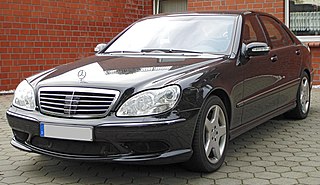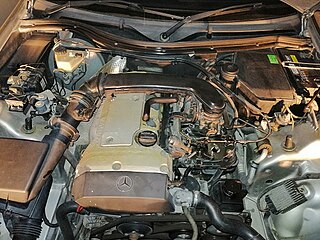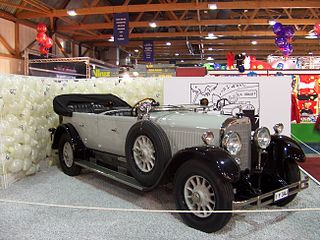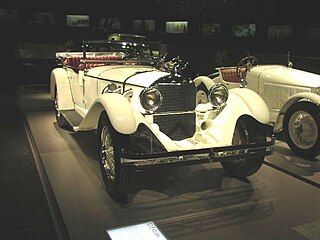Related Research Articles
Mercedes-AMG GmbH, commonly known as AMG, is the high-performance subsidiary of Mercedes-Benz AG. AMG independently hires engineers and contracts with manufacturers to customize Mercedes-Benz AMG vehicles. The company has its headquarters in Affalterbach, Baden-Württemberg, Germany.

The Mercedes-Benz M271 engine is a straight-4 automobile piston engine family used in the 2000s (decade).

The Mercedes-Benz M113 engine is a gasoline-fueled, spark-ignition internal-combustion V8 automobile engine family used in the 2000s. It is based on the similar M112 V6 introduced in 1997, then later phased out in 2007 for the M156 AMG engine and the M273 engine.

The Mercedes-Benz W220 was a range of flagship sedans which, as the fourth generation Mercedes-Benz S-Class, replaced the W140 S-Class after model year 1998 — with long and short wheelbase versions, performance and luxury options; available four-wheel drive; and a range of diesel as well as gas/petrol V6, V8, and V12 engines. Compared to its predecessor, the W220 had somewhat smaller exterior dimensions but offered greater interior volume, particularly in the long-wheelbase versions, and slightly less cargo volume.

The Daimler-Benz DB 603 was a German aircraft engine used during World War II. It was a liquid-cooled 12-cylinder inverted V12 enlargement of the 33.9 Liter DB 601, which was in itself a development of the DB 600. Production of the DB 603 commenced in May 1942, and with a 44.5 liter displacement figure, was the largest displacement inverted V12 aviation engine to be produced and used in front line aircraft of the Third Reich during World War II.

The M156 is the first automobile V8 engine designed autonomously by Mercedes-Benz subsidiary Mercedes-AMG, as previous AMG engines have always been based on original Mercedes engines. The engine was designed to be a naturally aspirated racing unit, and is also used in a number of high-performance AMG-badged Mercedes-Benz models. The engine was designed by Bernd Ramler, famed by the design of the Porsche Carrera GT's 5.7-liter V-10 engine.

The M111 engine family is a straight-4 automobile engine from Mercedes-Benz, produced from 1992 to 2003. Debuted in the 1992 Mercedes-Benz E-Class (W124), this engine family is relatively oversquare and uses 4 valves per cylinder. All engines in the family use a cast iron engine block and aluminum alloy cylinder head.

The Mercedes-Benz 380 is an eight-cylinder powered automobile introduced by the German manufacturer Mercedes-Benz at the Berlin Motor Show in February 1933. It was withdrawn from production during 1934. Several models with similar names were produced by Mercedes-Benz during the 1930s, so that in retrospect the car is frequently identified using the manufacturer's Works Number as the W22.

Kompressor is a marketing name for forced induction (supercharged) Mercedes-Benz engines. The term is not widely used by other motor manufacturers.

The Mercedes 15/70/100 PS was a large automobile introduced by Daimler in 1924. Production continued till 1929 by which time Daimler had merged with Benz & Cie as a result of which the car's name had changed to Mercedes-Benz Typ 400.

The Mercedes 24/100/140 PS was a large luxury car introduced by Daimler of Untertürkheim in 1924. Production continued until 1929 by which time Daimler had merged with Benz & Cie and the car's name changed to Mercedes-Benz Typ 630. The car was conceptually and structurally similar to the contemporary Mercedes 15/70/100 PS, but the 24/100/140 PS was longer, heavier, more powerful, faster and more expensive.

Mercedes-Benz W202 is the internal designation for a compact sedan/saloon manufactured and marketed by Mercedes-Benz between 1992–2001, as the first generation of the C-Class, now in its fifth generation. Replacing the 190 series/W201 in June 1993, the C-Class sedan was Mercedes' entry-level model until 1997, when the company launched the A-Class. Production reached 1,847,382 over model years 1994–2000.

The Mercedes-Benz C-Class (W203) is the internal designation for a range of compact executive cars manufactured and marketed by DaimlerChrysler from 1999 to 2010, as the second generation of the C-Class — in sedan/saloon, three-door hatchback coupé and station wagon/estate body styles.

The Mercedes-Benz S-Series (W06) was a successful line of sports cars produced from 1927-33 that bore the nickname, the "white elephants."

The Mercedes-AMG GT 4-Door Coupé is an executive car (E-segment) introduced in 2018 by Mercedes-AMG. It is marketed as a five-door variant of the AMG GT two-door sports car. Despite the name and style, the GT 4-Door Coupé is closely related to E63 wagon with its performance chassis, and is featured by the AMG-specific rear frame and a different front axle for better kinematics.

The Mercedes-Benz C-Class (W206) is the fifth generation of the Mercedes-Benz C-Class which is produced by Mercedes-Benz Group AG since 2021. It replaces the W205 C-Class which has been produced since 2014. The fifth-generation C-Class is available in sedan (W206), station wagon/estate (S206), and long-wheelbase sedan (V206) body styles. The W206 C-Class is based on the Mercedes MRA II rear-wheel drive modular platform also used by the W223 S-Class.
The Mercedes-Benz M06 engine is a supercharged, 6.8-liter to 7.1-liter, straight-6, internal combustion piston engine, designed, developed and produced by Mercedes-Benz; between 1928 and 1934.
The Mercedes-Benz M09 engine is a naturally-aspirated, 3.4-liter, straight-6, internal combustion piston engine, designed, developed and produced by Mercedes-Benz; between 1928 and 1929.
The Mercedes-Benz M03 engine is a naturally-aspirated, 3.0-liter, straight-6, internal combustion piston engine, designed, developed and produced by Mercedes-Benz; between 1926 and 1927.
The Daimler-Mercedes M836 engine is a naturally-aspirated and supercharged, 3.9-liter to 4.0-liter, straight-6, internal combustion piston engine, designed, developed and produced by Mercedes-Benz, in partnership with Daimler; between 1924 and 1929.
References
- ↑ "1924→1926 Mercedes 24/100/140 PS | Review". Supercars.net. 18 April 2016. Retrieved 10 November 2021.
- ↑ "Mercedes 24/100/140 PS, 1924-1926. Mercedes-Benz 24/100/140 PS, 1926-1928. Mercedes-Benz 24/100/140 PS Typ 630, 1928-1930". Mediadaimler.com. Retrieved 10 November 2021.
- ↑ "Collection 4: 24/100/140 PS Mercedes-Benz roadster". Mercedes-benz.com. Retrieved 10 November 2021.
- ↑ "1928 Mercedes 24/100/140 hp Type 630 Pullman Convertible specifications | technical data | performance | fuel economy | emissions | dimensions | horsepower | torque | weight". Carfolio.com. Retrieved 10 November 2021.
- ↑ "1928 Mercedes 24/100/140 hp Type 630 Pullman Limousine specifications | technical data | performance | fuel economy | emissions | dimensions | horsepower | torque | weight". Carfolio.com. Retrieved 10 November 2021.
- ↑ "Bonhams : A rare supercharged,1926 MERCEDES-BENZ 24/100/140 PS MODEL K La Baule Transformable Chassis no. 35426 Engine no. 60616". Bonhams.com. Retrieved 10 November 2021.
- ↑ "Mercedes 15/70/100 hp - MB 24/110/160 hp Model K, 1924 - 1930". Mercedes-benz-publicarchive.com. Retrieved 10 November 2021.